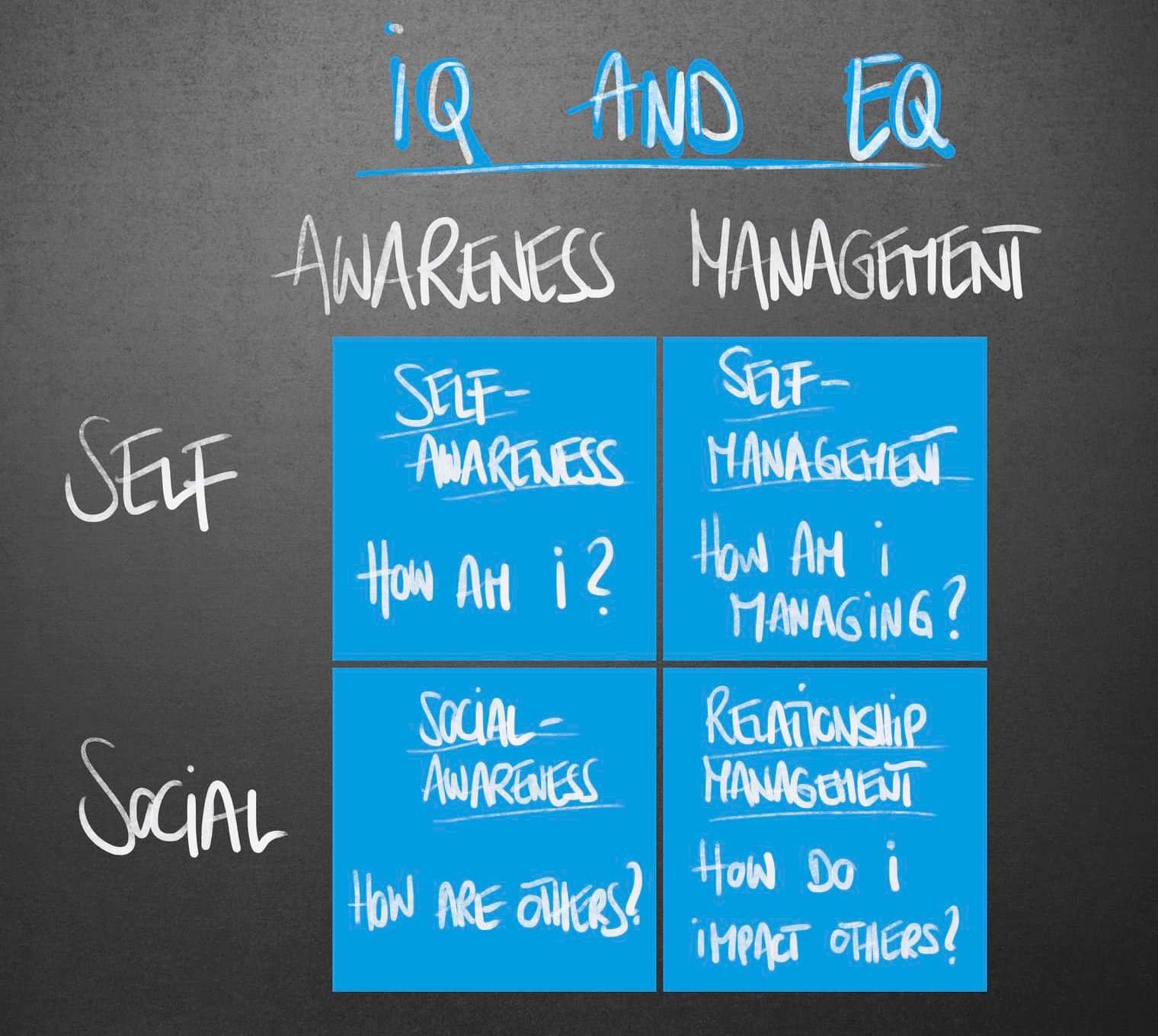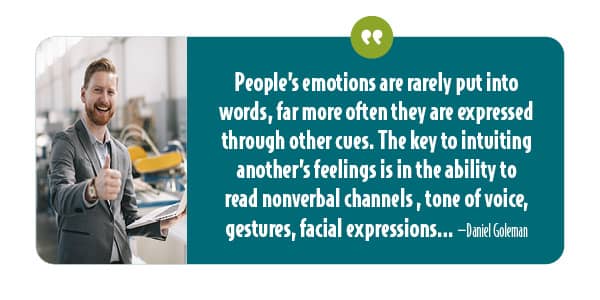Leadership without empathy and emotional intelligence is like an empty milk carton for a hungry teenager—disappointing and deflating.
Today's leaders and businesses cannot succeed any longer without creating a culture where employees and teams can assert their best work and thrive in the workplace. Are you creating a business culture that people want to work at—and stay!?
Estimated reading: 7 minutes

Heartmanity is proud to partner with outstanding companies that we wholeheartedly recommend so this post may contain affiliate links. This means if you click on a link and purchase something, we will receive a commission at no extra cost to you. Thank you for supporting Heartmanity's mission!
Let's face it, effective communication is the lifeline of every company. And when managers and leaders micromanage and treat their people poorly, there is higher turnover. However, when leaders' communication is empathetic and authentic, productivity, job satisfaction, and retention organically rise. Authentic leadership inspires employees while holding them accountable.
Better communication leads to better work relationships. And emotional intelligence and empathy are two vital stepping stones that enhance leadership skills. The impact of higher or lower emotional intelligence is especially evident in the workplace.
Why Authentic Leadership Requires Heart and Practice
A thriving team is healthy when a group is continually replenished through mutual respect, nurturance, contributions, and diversity. And to make these dynamics work, emotional intelligence is imperative!
For instance, if you take the analogy of a family, the job of parents is to create a safe environment for children to grow, develop, and be successful in that development. One of their responsibilities is to provide the raw materials that cultivate children’s uniqueness, character, and moral goodness. To achieve this outcome, parents need to be healthy role models, giving children nurturance, knowledge, and skills.
This role requires patience, heart, and empathy!
Leaders Need to Model the Behavior They Want
Leadership—like it or not—is a role much like that of a parent. As a leader, you are an authority figure to your employees and they depend on you as their model.
At the end of the day, your employees are like children looking to you for guidance and support. It is your responsibility to foster creativity, autonomy, and self-confidence in your team. By embracing emotional intelligence and empathy in your leadership style, you can help your employees be motivated in their work.
When our “parents” lack emotional intelligence, empathy, and self-management, the system (team or company) breaks down.
In today's culture, employees are demanding much more: more flexibility in their schedules, higher pay, and opportunities to hone their skills and utilize their talents. They also desire meaningful connections with their leaders.
In the leadership role, it is important to understand how to communicate effectively so employees can relate to you and feel like you care. This relationship involves building trust and rapport with your employees and inspiring them through your vision for the company.
In professional environments, communication requires you to understand and interact with other C-Suite leaders, managers, employees, and many times, clients. Therefore, it's crucial that you are aware of your impact and learn to be responsive to those around you.
What Is Emotional Intelligence and Why Is It Important in Leadership?
Before we go any further, let's define emotional intelligence.
Emotional intelligence is the ability, or emotional quotient (EQ), of a person's awareness, emotional regulation, expression, and management of their feelings and behaviors appropriately. How you manage yourself and navigate everyday situations determines if you will be a successful leader. The importance of emotional intelligence cannot be underestimated.
Daniel Goleman, who popularized emotional intelligence, breaks it down into five elements which are as follows:
- Self-awareness
- Self-regulation (or management)
- Motivation
- Effective communication (or social skills)
- Empathy
Self-awareness is how you understand your own thoughts, emotions, behaviors, and your impact on others. Self-regulation allows you to manage those thoughts, emotions, and behaviors.
Motivation embodies the values and internal promptings that inspire and drive you in life and work.
Social awareness is an umbrella for the skills supporting awareness of others' perspectives and experiences, social interconnectedness, collaboration, and communication.
Finally, empathy is your ability to understand others' emotions and respond to the people around you in a caring way. For example, managers who show more empathy toward their direct reports encounter lower conflict and they are better able to motivate employees.

Examples of a person with high emotional intelligence:
- Considers and accepts feedback and constructive criticism graciously.
- Keeps the lines of communication open.
- Restrains and regulates their feelings.
- Synergistically collaborates with others.
- Recognizes their triggers and appropriately calms negative emotions.
- Accurately senses another person's mood and the direction of a conversation.
- Engages in continual learning (and for leaders: leadership development).
Examples of low emotional intelligence when someone is lacking the key elements listed above:
- Gets easily frustrated or offended.
- Is prone to anger or arguments.
- Holds grudges or fails to let go of past disputes.
- Is hypersensitive, stressed, or overwhelmed by their surroundings.
- Misunderstands those around them.
- Feels misunderstood regularly.
We see workplace drama when employees gossip, backbite, complain or portray other unhelpful behaviors. Employees can also lack relationship management, be unable to resolve conflict, have poor organizational skills, and be short on self-awareness. It is up to leaders to curtail employees' unproductive behaviors and set the standard for a company.
So how do you achieve exceptional leadership and a heightened understanding and mastery of the five crucial elements of emotional intelligence?
Let's dig into ways to do just that!
Deep Dive: "What Is Emotional Intelligence?"
Why Emotional Intelligence Is Essential to Communication
As you know, communication involves the speaker (yourself), the listener (whoever you’re speaking to) and the information being relayed between both. Communication isn't just what you say, it's how you say it and whether you're hearing the words of the other person or truly understanding.
And how you come across in interactions will often depend on what's going on inside you!
That's why emotional intelligence is crucial whenever we communicate. To lead authentically, you must be able to calm yourself, actively listen, articulate clearly, resolve conflict effectively, observe and notice body language cues and tone of voice, empathize, and provide effective feedback when needed. Phew!
No one ever benefited from a lack of communication or miscommunication! Fear not—you can develop emotional fitness and key soft skills!
Let’s explore the intersection of emotional intelligence (EQ), empathy, and effective communication—they’re a powerful combination!
3 Key Leadership Skills of Effective Communication in Leadership
There are three key components to solid communication in leadership: listening attentively, utilizing nonverbal cues, such as body language, and being emotionally present.
1. Listening attentively.
Being actively engaged and focused on what your employees are saying is a valuable ability and helps you build trust, which is essential for good communication in leadership. Whether you are listening to feedback about a project or offering emotional support, paying attention to what your employees have to say shows that you value their input and opinions.
2. Utilizing nonverbal cues.
In addition to listening attentively, it is important to utilize nonverbal cues to communicate well with your team. These micro-actions include maintaining good eye contact, using positive body language such as open postures and smiles, and being mindful of verbal fillers like "um" and "uh." These signals can make a big difference in how your employees perceive you. And when you're self-aware, these factors can also help you build rapport with your team. You are modeling in everything you do!
Employees' cues are equally vital. Observe them with curiosity and practice sensing if their words match their body language. Roll back the veil and really connect.

3. Being emotionally present.
Finally, in order to lead authentically, it is essential that you are able to be emotionally present with your employees.
Being emotionally present means acknowledging your emotions as well as others. Empathetic leaders know how to respond compassionately. They are willing to put themselves in someone else's shoes.
By approaching your employees with openness, you can help them feel heard and understood. Whether you are guiding your team through a difficult project, simply offering guidance to new graduates, or managing seasoned professionals, your ability to communicate influentially and lead with empathy will have a huge impact on the success of your company.
How to Increase Emotional Intelligence in Leadership
Not everyone has the desire to learn to be more emotionally savvy. So congrats! Taking this first step towards educating yourself is a great sign.
Emotionally fit people make conscious efforts toward self-improvement, mental health and mindfulness. Below are simple ways to increase your self-awareness.
Educate yourself on brain fitness.
Brain fitness refers to the health of our cognitive skills, like problem-solving, memory, cognitive processing, comprehension, and communication. By strengthening the front cortex (the logical part of your brain), you'll be more likely to manage your energy, regulate your emotions, make good decisions, and sharpen your focus and attention. (It's far easier to listen intently when your mind isn't wandering!)
Utilize Ted talks, brain fitness apps, and online courses; these resources will educate you and help you to increase your ability to understand and manage your emotions, be a more effective leader, and bring out the best in your company culture.
Make note of your emotional triggers.
A trigger is anything that incites a strong emotional reaction, such as fear, anxiety, or anger.
- What upsets you?
- How do you typically address your pet peeves?
- Are there times of the day you are more stressed and reactive?
Be mindful and observe yourself so you can catch yourself before lashing out. Sometimes, briefly examining our past can give us clues and equip us to better approach the future.
Practice little doses of empathy for yourself and those around you.
As mentioned earlier, empathy is one of the five elements of emotional intelligence. Thanks to mirror neurons, it's how we recognize and respond to the emotions around us. Empathy is responsible for understanding how others feel when they communicate with us and it leads to compassion and promotes better communication.
However, being kind to yourself is just as valuable as being present to others. So, don't forget to give validation to yourself, too! It can be tough and lonely being a leader with massive responsibilities.
And when you do empathize with others, it's not only about listening to someone's emotions; sometimes, it is as simple as showing genuine interest. For example, ask how your manager's weekend was at the in-laws or inquire with your partner how their day went.
Learning to have a sincere interest in others is the beginning of all true empathizing and a great step in forming healthier relationships at home and work. When it comes to strengthening your EQ, it’s best to put a specific focus on how you approach everyday life.
For a deep dive into empathy: "What Is Empathy and Why Is It Important?"
For an in-depth, online leadership course, check these out!

Growing Yourself as an Empathetic Leader
When you communicate using empathy as a leader, you let your managers, employees, and business associates know that you care about what they say. You learned how to give little doses of empathy above, now let's explore a few more ideas and nuances of how to implement in your leadership.
Acknowledge others empathetically.
When someone is telling you their feelings or troubles, a favorite go-to is "I understand." Every leader that I've ever coached has relied on these two words as if they were gold. And you most likely will instinctively reach for them, "I understand"—don’t!
No matter how strong your empathic skills are, there’s no surefire way to actually feel the experiences of the other person. When you use the phrase "I understand," most people you're saying it to are typically thinking, "There’s no way you could possibly understand!"
Ever had that thought yourself?
Instead, use phrases that alert them that you are invested in their well-being and the conversation, like “sounds like,” “feels like,” or “looks like,” which encourages them to continue talking. And if you don't have a clue what they're feeling, say, "I can't imagine what you're feeling!"
Listen more than you speak.
Leaders are better equipped to handle situations when they listen without interrupting or trying to get their point across. Offering a listening ear to others allows you to put your own opinion and perspectives on pause. This tip may seem simple, but it's amazing how many people ignore it! Listening attentively also allows you to gather information that will be helpful when you do respond. Try it!
Pick the right time to share a personal experience.
For some, it is a natural reflex to relate to a person by sharing their own similar experience they’ve gone through personally. But empathy is about turning the spotlight away from ourselves to someone else. If we move too quickly to our own experience, the person can feel like we're uninterested in their unique experience. Our story can actually derail their desire to share. And if our energy is stronger than theirs, we can entirely change the direction of the conversation, even if unintentionally.
When we embrace empathy, open communication encourages people to share their thoughts and what’s underneath: their values, emotions, beliefs, and motivation. People open up!
But first, you have to break some familiar habits that masquerade as empathy.
What Does It Take to Lead with Emotional Intelligence?
Emotional intelligence embodies all the core skills that help us navigate everyday lives and relationships productively.
Great leaders understand the intersection of empathy, emotional intelligence and communication as crucial to success in entrepreneurship, leadership and business. Communication becomes less of a hurdle and more of a bridge that creates ease and connection.
It’s commendable that you’ve taken a necessary step to learn more about emotional intelligence, but don't let the learning stop here. There’s no downside to keeping the momentum going!
This blog post is just the tip of the iceberg. So, where do you go from here?
Clarity is a few clicks away! Email us at support@heartmanity.com to schedule a call. The qualities of a good leader are already inside of you. We draw them out and hone your EQ using your individual strengths through personalized executive one-on-one coaching.
And if you're really ready to develop greater EQ, try the leadership online course.









